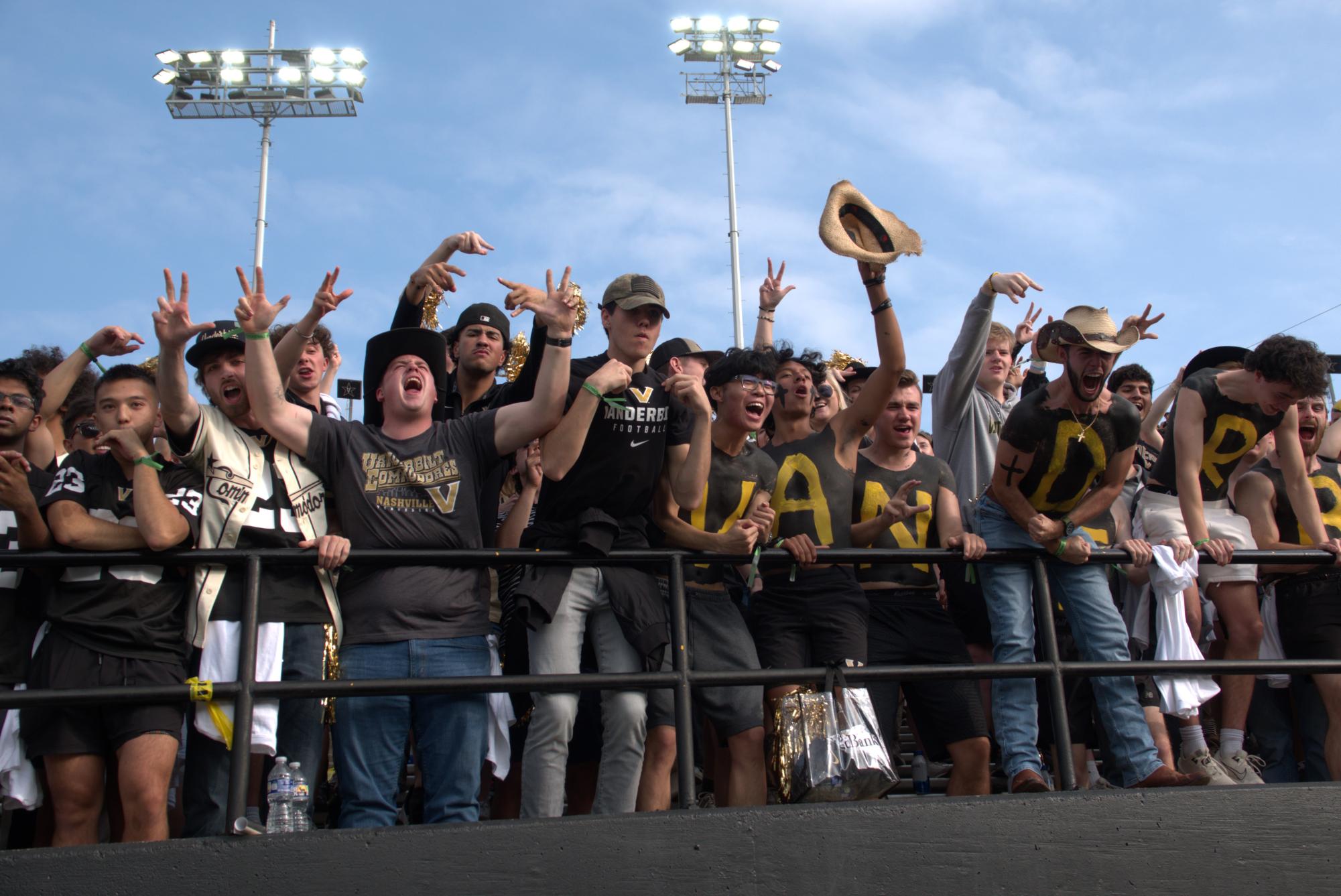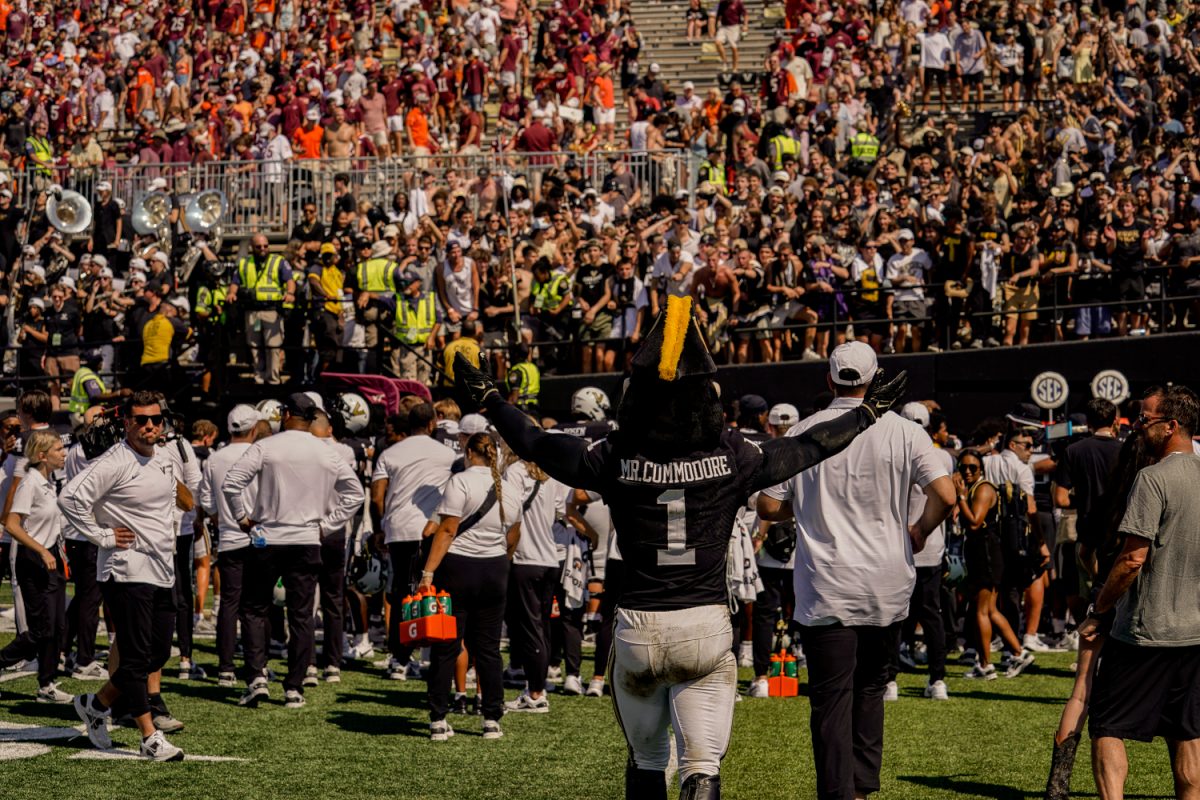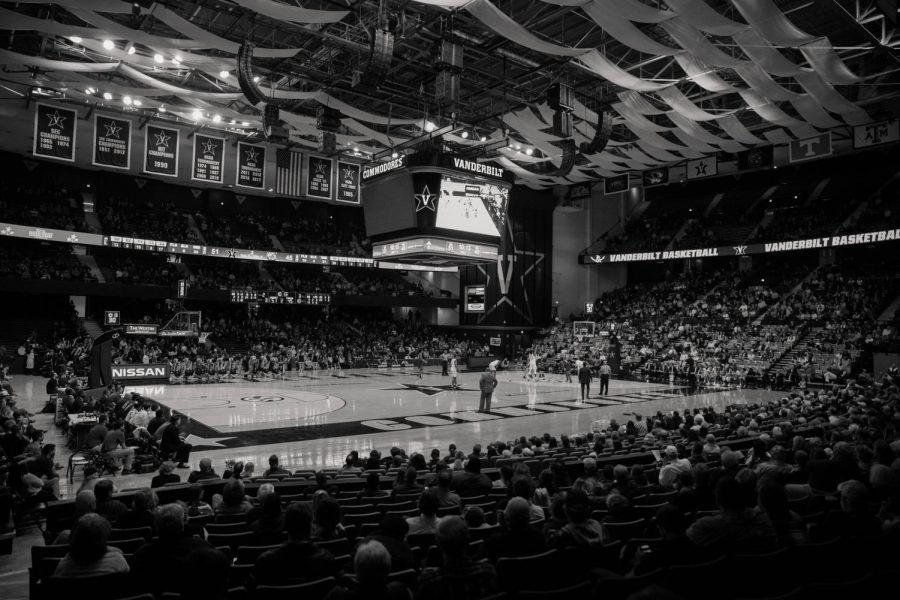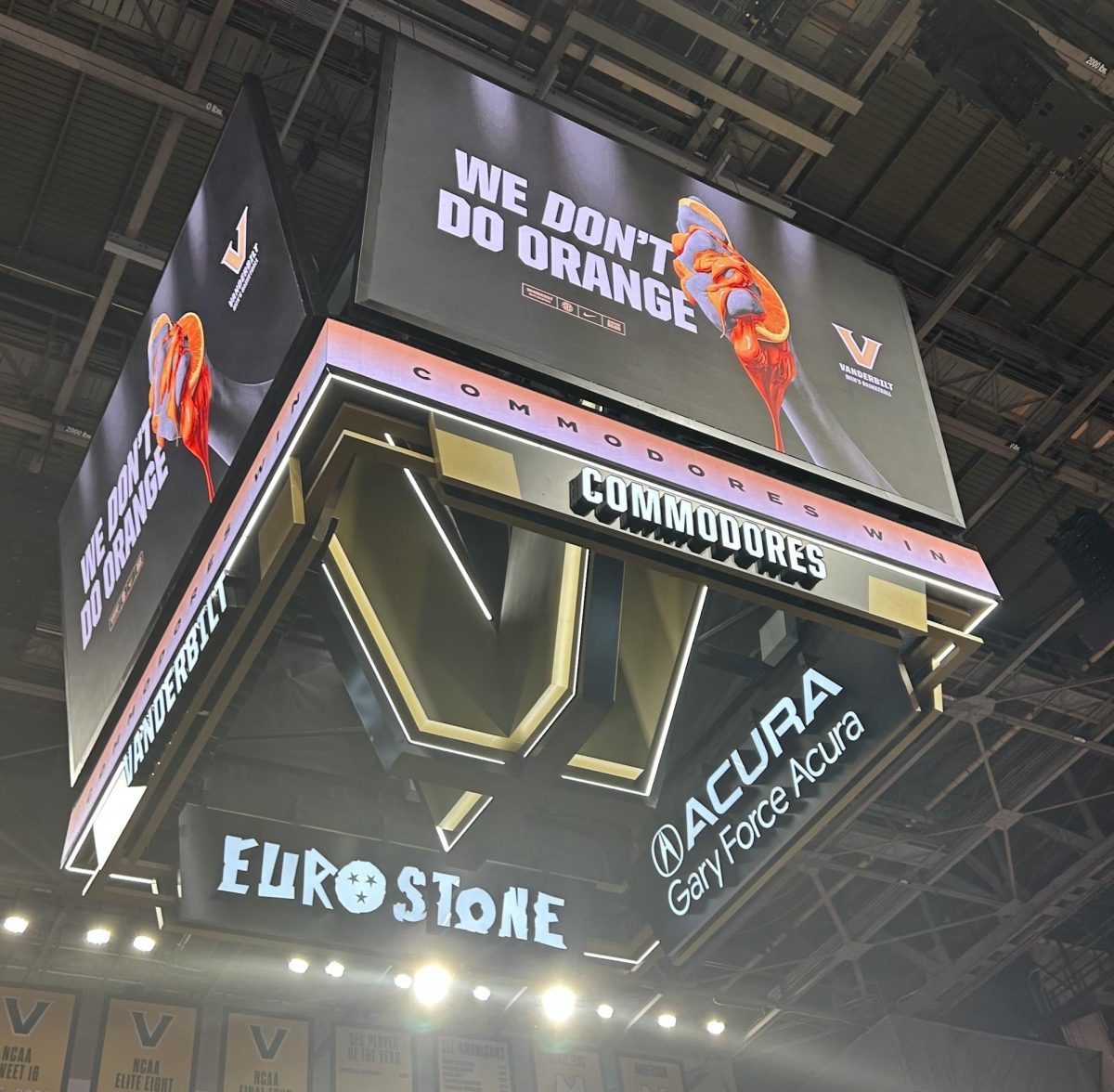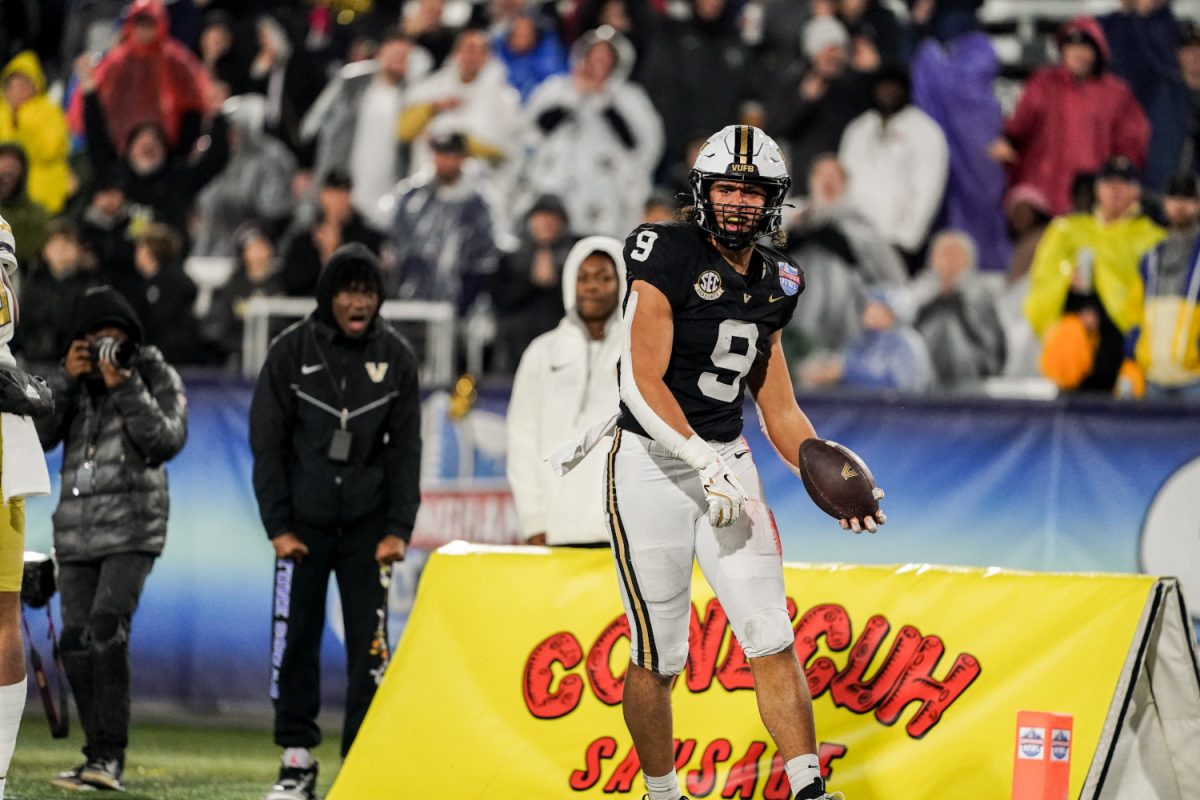Editor’s Note: Points of View is a new type of editorial from The Hustler’s Opinion section to create opportunities for staff to comment on important, timely campus issues. Through this new format, several writers will be able to give their unique perspective on some of the most important questions among students.
Now nine weeks into the regular season of college football, Vanderbilt has proven to be a formidable opponent in the SEC. After wins against previously ranked No. 1 Alabama at home and Kentucky on the road, Vanderbilt was slated to battle at home against No. 5 Texas this past week. Following several games where students were not able to access the student section due to it reaching capacity, Vanderbilt announced new ticketing and entry processes. Within 15 minutes of the new claim window being opened on Oct. 25, all student tickets for the game had been claimed. The Hustler’s Opinion staff shared their points of view surrounding this new policy as Vanderbilt moves farther into the football season.
What does this new ticketing system mean for the Vanderbilt student community?
Kate Connell, Opinion Editor: For years, Vanderbilt students have begged for a football team good enough to be a strong SEC competitor, and now our prayers have been answered. This new ticketing system, like most other new systems implemented, has its fair share of issues that we must learn from in order to improve the student experience the best we can. As we enter a new era of Vanderbilt’s football program, we as students must also learn to accept change. If we want our team to be as good as Alabama or Georgia, we must also accept that we will most likely adopt a ticketing system that more closely resembles theirs. I am personally excited for an increased energy to attend football games, even if that means the demand increases as well.
Evan Nava, Staffer-in-Training: From the logo change to FirstBank Stadium renovations, Vanderbilt has been trying to usher in a new era of the football program. The new ticketing system most clearly represents this new era in Vanderbilt football. By updating the system, the university is able to bring purpose to each previous change they have made to the football program. It shows that the future of the program is hopeful, which means a lot to students. A promising future for the football team instills a strong sense of pride and notoriety to a program that many students were once ashamed of. The new ticketing system, while annoying, does bring hope for many students that our football program is on the right track.
Anisa Juma, Staffer-in-Training: Vanderbilt’s new ticketing system changes the relationship between the Vanderbilt student community and home games. Rather than tickets being gifts to the student body where anyone has the choice to attend a game, it becomes a gladiator-style fight to claim a ticket before they sell out. Treating students as customers who have to guess if they’ll even have a spot for the incoming game creates unnecessary stress and competition that diminishes the school spirit and community we’ve finally gained. The demand for tickets has caused a rise in people selling their tickets online for higher prices, which not only shouldn’t be allowed, but shouldn’t have to be an option for any Vanderbilt student.
Do you agree with the priority ticket access given to students who have gone to three or more home games?
George Albu, Staff Writer and Photographer: Simply, no. The issue at hand lies in the fact that big ticket games are in demand, but the stadium has not grown to accommodate. The big problem with the priority ticket system is that it allows superfans to experience the magic of a historic game once again, while thousands of other students are eager, but might never experience that magic. This leaves a large portion of students alienated, creates divides in our fan community and overall sucks the Commodores’ hype dry. The rule — while making sense on the surface — does have considerable holes in categorizing fans as purely those who sit in the student section. For students in football-related extracurriculars or those who have previously sat with their parents in non-student seats, getting a ticket using this new system is significantly harder. This is despite the fact that they have contributed the same amount of time and energy, if not more, as those who got priority by sitting in the student section.
Arden Madden, Staff Writer: I disagree with Vanderbilt’s decision to give priority ticket access to students who have attended three or more games, and honestly, I find it a bit unreasonable. Like many students, I have a job that requires me to work every Saturday, so I haven’t been able to attend any games so far. It’s extremely difficult for me to get shifts covered, and prioritizing students who have more flexible schedules feels unfair. I’ve tried several times this semester to get time off to attend a game, and I finally succeeded only to barely get a ticket myself, while my friend who planned to go with me couldn’t get one at all. The institution should ensure equal access to these opportunities so that all students have a fair chance to experience quintessential college events like football games.
Peyton Price, Staffer-in-Training: Coming into my first year at Vanderbilt, I didn’t expect much from our football team; we went 2-10 last year and several upperclassmen informed me that students hardly attend the football games. So, it would have come as quite a shock to know that six games into the 2024 season, Vanderbilt would have to limit the amount of students allowed to attend the game. If Vanderbilt continues showing up as a competitive SEC football team, tickets shouldn’t be handed out like they’re nothing, and I believe having priority ticket access for students who have attended 3+ games is a good system. At other SEC schools like Texas or Alabama, you have to purchase student tickets, whether that be in a package or just for individual games. Instead of making us purchase tickets, Vanderbilt set up a system that prioritizes those who have proven to be dedicated fans and most likely to attend the game. Although it’s unfortunate that not everyone could get tickets to the Texas game, the implemented ticket policy is something that comes with the remarkable season our team has been having. Ultimately, we should be grateful that the most committed fans were rewarded instead of everyone having to purchase tickets.
Was the overflow seating enough to accommodate Vanderbilt students wanting to see the Vanderbilt v. Texas game?
Noah Weitzel, Deputy Opinion Editor: How disappointing it is that almost every game I’ve ever attended over four years has had more away fans than Vanderbilt ones at the stadium.? At the end of the day, the program (and the university for that matter) is run like a business. Those away fans are paying customers, and the students, in a football sense, are not (other than the huge caveat that we contribute our tuition towards the university). The overflow seating was actually a pretty fair alternative, especially since one option was standing in the brand new north end zone facility where only the well-paying fans will be permitted in the future. The area being standing room only is not really an issue as most students are standing for 95% of the game in the student section anyways.
Claire Andrews, Staff Writer: After attending the game on Saturday, I can say without question that the overflow system was over-ticketed. For those who received an old school-style paper ticket, security and stadium staff made sure to inform students to sit in their assigned seats. However, my group and those near me were assigned to seats directly opposite of the entrance students were told to go through, adding another 20 minutes to the trek to my seat. Despite the effort it took to squeeze through a frighteningly tight crowd outside the stadium, it became even more crowded when I made my way to my section. Though I had an assigned seat number, students piled into my row, making it impossible to sit during TV timeouts or between each quarter. These crowded conditions made it challenging to raise my arms, throw the VU hand sign or react comfortably to the game in front of me. For sold out games like Vanderbilt v. Texas, the Vanderbilt Ticketing Office needs to take student needs into account, not only in terms of over-ticketing the student section, but also in enforcing capacity rules to create a more comfortable and safer stadium environment.
Juma: As someone who actually went to the Vanderbilt v. Texas game, and has attended four of the five games so far, the seating in the student section was packed to the brim. It was the first time I had witnessed every seat being filled all the way to the back. Had they not introduced this policy that would restrict the student population that could actually enter, I believe it would have been more dangerous for students within the stands and it would take away from their enjoyment in the game if they were concerned about their safety.
Are the alternate opportunities that Vanderbilt provided for students to attend the game, such as expanding the amount of seating and hosting a watch party at the recreation center, sufficient?
Connell: Even though there were a significant number of students who weren’t able to attend the game in the student section, there were still options available for those who wanted to participate that I believe to be sufficient. Simply, you would not see this from other universities of successful football teams — Vanderbilt is making a true effort to be as inclusive as it can be with the resources it has available. While a watch party with food and drinks may not be equivalent to screaming “horns down” from the student section, it certainly shows students that the university cares.
Albu: I would argue that they are sufficient. Vanderbilt physically cannot build more bleachers — even if they did expand the amount of student seating — this season, so their goal should be to give as much access as they can. That means fostering a community outside of FirstBank. Hosting a watch party with catering was easily sufficient, but the extra mile is their partnership with the Xfinity TV on campus program. I would argue that, even though nothing will truly compare to the energy of being in the stands, hosting a well-planned watch party alongside allowing any student to watch the game live is reasonably sufficient.
Juma: I believe that, considering Vanderbilt is still in the process of finishing the construction of the football stadium, there could be later discussions of expanding the student section. However, a common sentiment is that students love being in the student section and the atmosphere it provides. I believe the watch party was effective in resolving any issues that came with the new ticketing system and allowed people to watch the game in an accessible and community-like manner. The watch party even provided benefits that are not available at the games such as free food and drinks for the students, making it an appealing option for those who couldn’t physically attend the game.
How will this impact students’ attitudes towards attending football games?
Nava: I think the new ticketing policy will make students want to attend more games in the future, given the off chance that a sold out game happens again. While this is a good thing, I think this could cause more ticketing incidents in which not everyone who wants to go to the game gets to go, as there will be people attending the game just to ensure they get priority ticketing for the bigger matchups. This could also cause more students to attend the game and leave early instead of sticking around for the entire game, as the only incentive regarding football attendance is entry into the stadium—not the length of time you are at the game. I think this could make going to the football games feel like more of a chore rather than a fun experience.
Weitzel: In all honesty, I don’t think the new ticketing policy will impact much. This is by far the best season that I have witnessed as a young Vanderbilt football fan. The students are going absolutely crazy supporting the team, which actually speaks more to the culture shift of this program than the improvement in their play. However, with success comes these barriers of attendance for everybody every time. We are, in effect, playing in a half-built stadium anyway, so it was poor timing to accommodate every fan; or from a different, forward thinking perspective, really great timing for the program’s growth. Rewarding those who showed up — even when success wasn’t promised — was not just a fair rule, it’s a consistent rule across universities nationwide.
Olivia Chung, Deputy Opinion Editor: Although myself and many others experienced the five stages of grief after getting to the top of the ticket-queue just to see the game was sold out, I don’t think the frustrating nature of Vanderbilt’s new ticket system will cause students to view the games negatively. As someone who didn’t get a ticket to the Vanderbilt v. Texas game, the newly competitive nature of securing tickets sparked an even stronger desire to attend a game — that and the extreme FOMO I felt as I sat in my bed while my friends were happily at FirstBank. On the other hand, I was profoundly annoyed by the new ticketing system and felt as though my next step was to never attend a game again as an act of defiance. While a lot of students were unlucky last weekend, I don’t anticipate the flawed ticketing system to serve as a deterrent to everyone’s school spirit—and more importantly, it won’t take away from how great of a season Vanderbilt football has had so far.
The entry policy has changed multiple times to help students who obtained tickets enjoy the game. How does this support the student experience at games?
Connell: As someone who very rarely gets to attend a college football game due to other priorities, I was really worried that attending the Vanderbilt v. Texas game would also mean being stuck in a crowded section with no ability to grab food and drinks or run to the restroom. Once I got my seat, however, I found it easy to come and go from the student section because of the wristband I was given. I hope the use of wristbands can be continued in the future, as it was extremely helpful in lowering the competition and hostility of students all trying to get into the student section.
Albu: I believe it is one of the greatest wins of the new change. Having a physical wristband that is both difficult to lose and counterfeit is a beyond-welcome addition. Marking an “x” can easily be faked by anybody sneaking in with a marker and stamps can easily be faded after washing your hands or from sweat. Wristbands provide an identifiable method of filtering through the ticketed students, allowing for smooth transition in and out of the stands, and letting students see more of the action on field instead of proving themselves with security.
If it were modified to include senior priority (given that there are only two home football games left for them) would you support that change?
Albu: I would support this if they keep it as a long-term solution. I would personally have it where seniors have priority and then a free-for-all for the other three grade years. This allows seniors to have their last home games if they wish, while still giving other grades a chance to participate. I would also not be opposed to perhaps a slight seniority sub-system where seniors get overall priority but divide the remaining student tickets by year. In this, for example, out of every 100 remaining tickets, 40 could go to juniors, 35 to sophomores, and 25 to first-years. This would allow a fair system that permits students to attend more games throughout their time at Vanderbilt, while accounting for the limited number of seats at FirstBank.
Madden: Yes, I would support that change. As a senior who transferred last year from a school that didn’t even have a football team, I’d love to take part in key college experiences like football games but I simply can’t afford to stop working during the school year. Although I finally managed to get a Saturday off for the first time in two years to attend a game, my friend, who is also a senior, couldn’t secure a ticket due to the new ticketing policies. Because of this and our schedules, we don’t have the chance to attend a game together before we graduate in the spring. While I don’t believe seniors should receive priority every time, each senior should at least be guaranteed access to one home game before graduating. With the resources our tuition provides to the institution, that seems like a fair expectation.
Weitzel: Seniors have very few home games to attend — if there was a decision to be made between a senior that has attended two home games and a freshman that has attended three, I think the senior deserves the chance to attend one of their last games and should be included in that priority group. My message to seniors is also this: If you were interested in going to the Texas game, you had opportunities to show up for our team. The student section was not full for the Alcorn State and Ball State games, and that counted for 2/3 of the requirement. Think about it this way — other universities ask students to pay for tickets, go to non-revenue sports games and build points, enter competitive lotteries for tickets, etc. Vanderbilt has never asked us that (sometimes, honestly, it never needed to) and I appreciate that about our athletic program.










